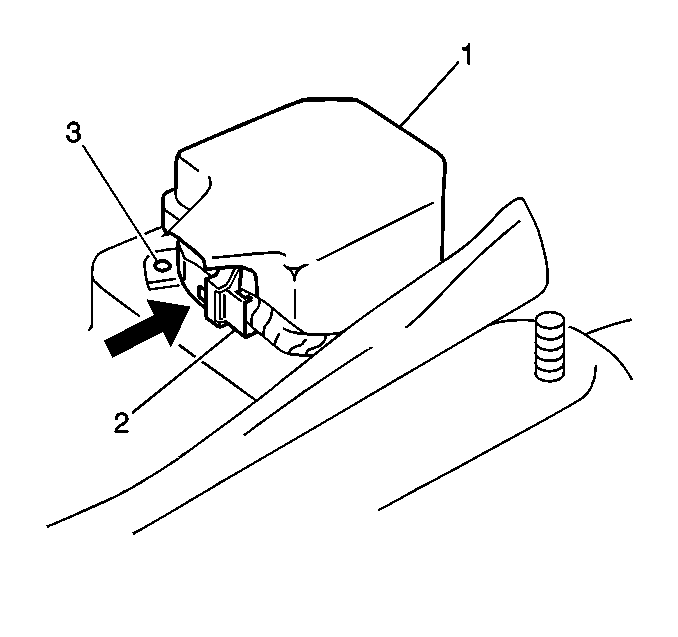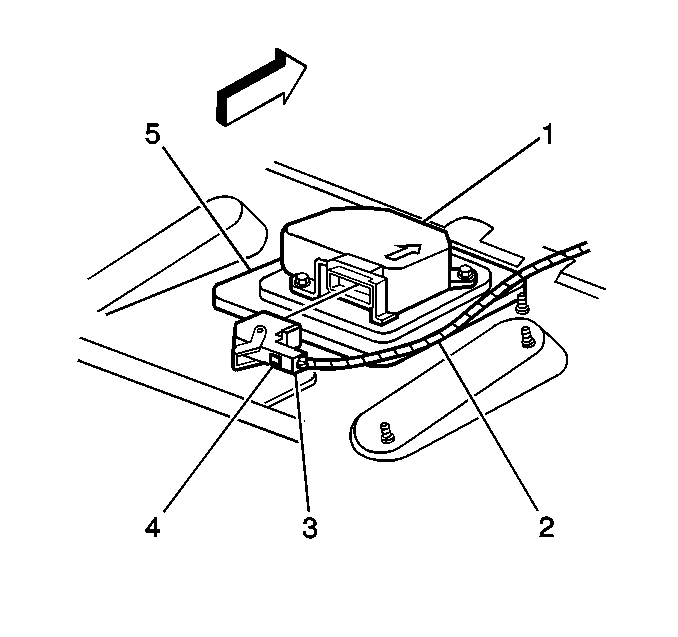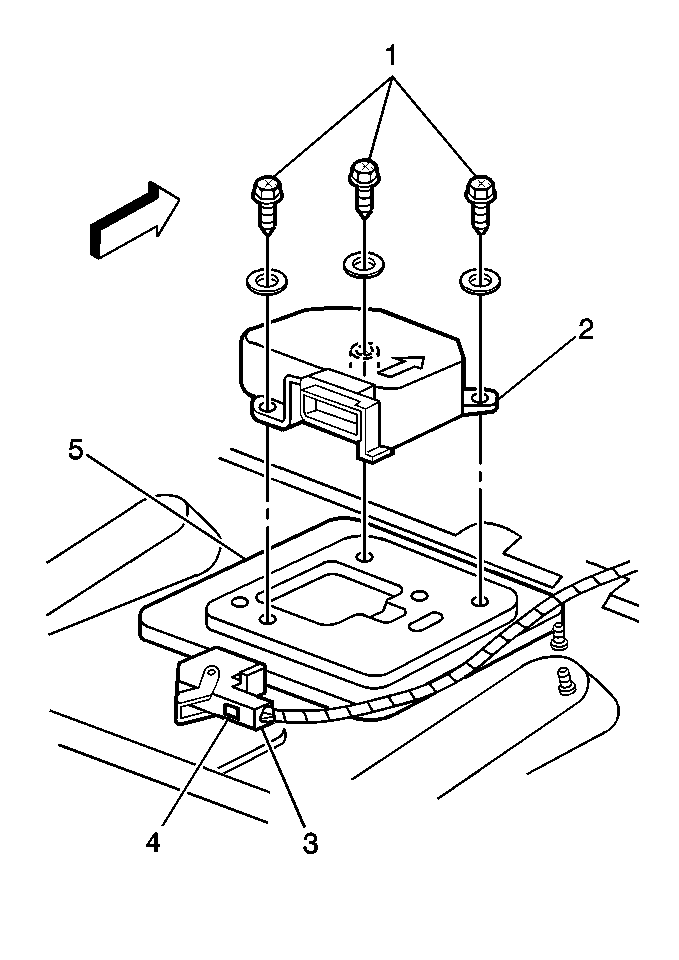CAUTION: Be careful when you handle a sensing and diagnostic module (SDM). Do
not strike or jolt the SDM. Before applying power to the SDM:
• Remove any dirt, grease, etc. from the mounting surface • Position the SDM horizontally on the mounting surface • Point the arrow on the SDM toward the front of the vehicle • Tighten all of the SDM fasteners and SDM bracket fasteners to
the specified torque value
Caution: If any water enters the vehicle's interior up to the level of the carpet or higher and soaks the carpet, the sensing and diagnostic module (SDM) and the SDM harness connector may need to be replaced. The SDM could be activated when powered, which could cause deployment of the air bag(s) and result in personal injury. Before attempting these procedures, the SIR system must be disabled. Refer to Disabling the SIR System.
With the ignition OFF, inspect the SDM mounting area, including the carpet. If any significant soaking or evidence of significant soaking is detected, you must perform the following tasks:- Remove all water.
- Repair the water damage.
- Replace the SDM harness connector.
- Replace the SDM.
Removal Procedure
- Disable the SIR system. Refer to Disabling the SIR System .
- Remove the front passenger seat. Refer to Front Seat Replacement in Seats and Carpet.
- Fold back the carpet to access the inflatable restraint Sensing and Diagnostic Module (SDM).
- Push the locking tab and release the Connector Position Assurance (CPA) from the inflatable restraint Sensing and Diagnostic Module (SDM) harness connector (2).
- Disconnect the SDM harness connector (3) from the SDM (1).
- Remove the SDM mounting fasteners (1).
- Remove the SDM (2) from the vehicle.



Important: The following repair procedures should only be used in the event that the inflatable restraint Sensing and Diagnostic Module (SDM) mounting studs and /or fasteners are damaged to the extent that the SDM can no longer be properly mounted.
First Repair
- Remove and discard the fastener.
- Use a new fastener GM P/N 10156138.
- Install the SDM mounting fasteners (1).
Tighten
Tighten fasteners to 10 N·m (89 lb in). Refer
to
Notice: Use the correct fastener in the correct location. Replacement fasteners must be the correct part number for that application. Fasteners requiring replacement or fasteners requiring the use of thread locking compound or sealant are identified in the service procedure. Do not use paints, lubricants, or corrosion inhibitors on fasteners or fastener joint surfaces unless specified. These coatings affect fastener torque and joint clamping force and may damage the fastener. Use the correct tightening sequence and specifications when installing fasteners in order to avoid damage to parts and systems.
in Cautions and Notices.Second Repair
- Remove and discard the fastener.
- Use a larger fastener GM P/N 10267482 with washer GM P/N 11500305.
- Install the SDM mounting fasteners (1).
Tighten
Tighten fasteners to 15 N·m (134 lb in).
Refer to
Notice: Use the correct fastener in the correct location. Replacement fasteners must be the correct part number for that application. Fasteners requiring replacement or fasteners requiring the use of thread locking compound or sealant are identified in the service procedure. Do not use paints, lubricants, or corrosion inhibitors on fasteners or fastener joint surfaces unless specified. These coatings affect fastener torque and joint clamping force and may damage the fastener. Use the correct tightening sequence and specifications when installing fasteners in order to avoid damage to parts and systems.
in Cautions and Notices.Installation Procedure
- Install the SDM (2) to the vehicle.
- Install the SDM mounting fasteners (1).
- Install the SDM harness connector (3) to the SDM (1).
- Install the Connector Position Assurance (CPA) to the SDM harness connector.
- Position the carpet to cover the inflatable restraint Sensing and Diagnostic Module (SDM).
- Install the front passenger seat. Refer to Front Seat Replacement in Seats and Carpet.
- Enable the SIR system. Refer to Enabling the SIR System .

Tighten
Tighten fasteners to 10 N·m (89 lb in). Refer
to
Notice: Use the correct fastener in the correct location. Replacement fasteners must be the correct part number for that application. Fasteners requiring replacement or fasteners requiring the use of thread locking compound or sealant are identified in the service procedure. Do not use paints, lubricants, or corrosion inhibitors on fasteners or fastener joint surfaces unless specified. These coatings affect fastener torque and joint clamping force and may damage the fastener. Use the correct tightening sequence and specifications when installing fasteners in order to avoid damage to parts and systems.
in Cautions and Notices.
